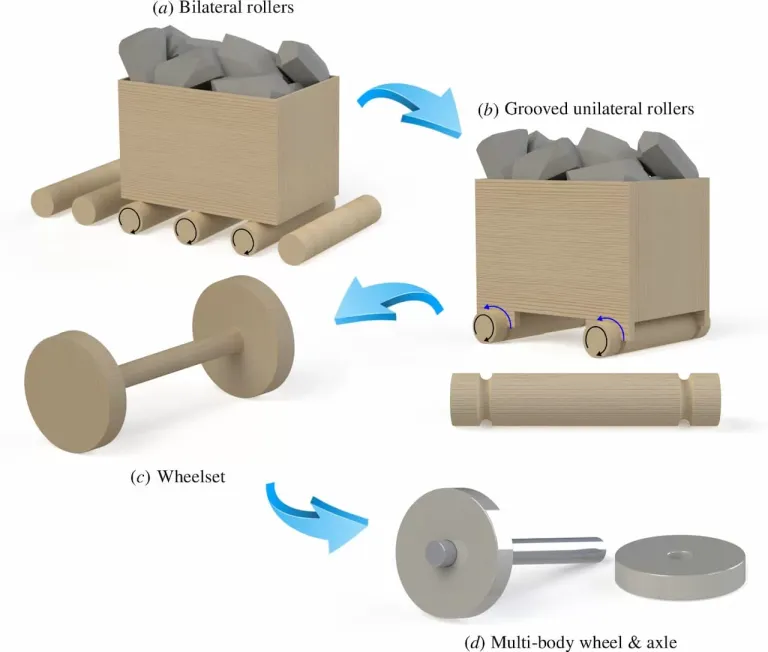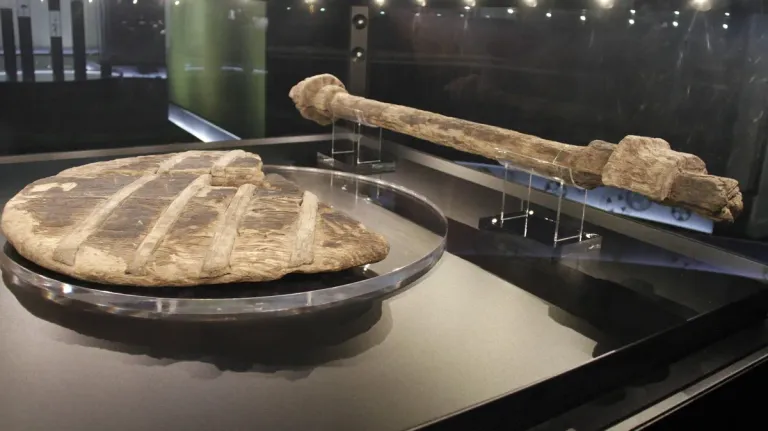Source

Mesopotamia (modern-day Iraq, Iran, and Syria) has long been considered the birthplace of the wheel. Archaeological evidence suggests that the Sumerians used wheels for pottery around 4000 BC and later on chariots and carts, based on the abundance of archaeological finds in the region.
Durante mucho tiempo, se ha considerado a Mesopotamia (actual Irak, Irán y Siria) como el lugar de nacimiento de la rueda. La evidencia arqueológica sugiere que los sumerios utilizaron ruedas para alfarería alrededor del año 4000 a.C. y posteriormente en carros y carretas, basándose en la abundancia de hallazgos arqueológicos en la región.
Another hypothesis places the origin of the wheel on the Pontic coast of northern Turkey around 3800 BC and some believe that the wheel may have been invented independently in different places around the world, due to the common need to transport heavy loads and overcome obstacles, but definitive evidence has not yet been found to determine with absolute certainty where and when the wheel was invented.
Otra hipótesis sitúa el origen de la rueda en la costa póntica del norte de Turquía alrededor del 3800 a.C. y algunos creen que la rueda pudo haber sido inventada de forma independiente en diferentes lugares del mundo, debido a la necesidad común de transportar cargas pesadas y superar obstáculos, pero aún no se ha encontrado una evidencia definitiva que permita determinar con absoluta certeza dónde y cuándo se inventó la rueda.
Source

Recent archaeological and computational mechanics studies suggest that the wheel may have been invented around 6,000 years ago in the copper mines of the Carpathian Mountains in Eastern Europe. Researchers say Neolithic miners faced unique challenges in these narrow, winding tunnels, which likely prompted them to develop a more efficient transportation system to move heavy ores.
Recientes estudios arqueológicos y de mecánica computacional sugieren que la rueda pudo haber sido inventada hace aproximadamente 6,000 años en las minas de cobre de los montes Cárpatos, en Europa del Este. Los investigadores sostienen que los mineros neolíticos enfrentaban desafíos únicos en estos túneles estrechos y sinuosos, lo que probablemente los impulsó a desarrollar un sistema de transporte más eficiente para mover minerales pesados.
The analysis showed that the invention of the wheel was a gradual process involving three key innovations: the creation of rollers, the attachment of wheels to an axle, and the independent rotation of the wheels. These improvements were instrumental in reducing friction and improving transport capacity in mine tunnels, representing a technical and cultural innovation that would later influence other nearby civilizations.
El análisis mostró que la invención de la rueda fue un proceso gradual que implicó tres innovaciones clave: la creación de rodillos, la fijación de ruedas a un eje y la rotación independiente de las ruedas. Estas mejoras fueron fundamentales para reducir la fricción y mejorar la capacidad de transporte en los túneles de las minas, lo que representa una innovación técnica y cultural que más tarde influiría en otras civilizaciones cercanas.
Source

This theory is significant because if confirmed, it could rewrite our understanding of when and where the wheel, one of humanity's most fundamental technologies, was invented, and establishes a direct link between the development of the wheel and the advancement of metallurgy, two pillars of civilization.
Esta teoría es relevante porque si se confirma, podría reescribir nuestra comprensión sobre cuándo y dónde se inventó la rueda, una de las tecnologías más fundamentales de la humanidad y además establece un vínculo directo entre el desarrollo de la rueda y el avance de la metalurgia, dos pilares de la civilización.
However, as with all scientific research, further studies and evidence are required to confirm this theory and fully understand the history of this fundamental invention. While this study offers an intriguing theory about the origins of the wheel in a mining context, much more research is required to confirm this hypothesis.
Sin embargo, como en toda investigación científica, se requieren más estudios y evidencias para confirmar esta teoría y comprender completamente la historia de este invento fundamental. Aunque este estudio ofrece una teoría intrigante sobre los orígenes de la rueda en un contexto minero, se requiere mucha más investigación para confirmar esta hipótesis.
More information/Más información
https://www.lavanguardia.com/mediterranean/20241023/10045521/first-wheel-invented-miners-carpathian-mountains-europe-axle-age-neolithic-copper-archaeology.html#:~:text=Now%2C%20a%20team%20of%20American,the%20Carpathians%20in%203900%20BC.
In fact, the wheel was invented a long time ago, I think the wheel was invented at the beginning of human journey. A 6000 year old wheel has been found, good news